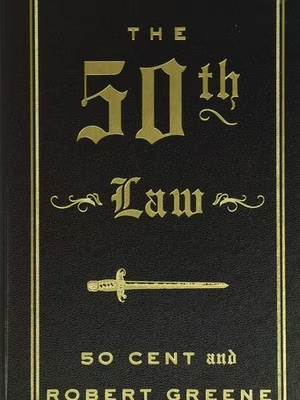Overview
The 50th Law is a manual on how to stop being afraid. Robert Greene observes that most of us walk around with a low-level anxiety that makes us conservative and hesitant. He contrasts this with 50 Cent, who survived the drug trade and the music industry by remaining calm and aggressive when others panicked.
The core message is that your greatest enemy is your own fear. When you fear less, you see more. You stop reacting emotionally to what people think and start seeing reality clearly. This summary connects Greene's historical examples (like Napoleon and Frederick Douglass) with 50 Cent's modern hustle to show you how to master your environment.
My Take: The "Fear Inventory"
Most people think they aren't afraid because they aren't currently running from a tiger. However, reading this book made me realize that "fear" in the modern world looks like procrastination, seeking approval, and staying in a job you hate. My unique angle for this book is to use it as a "Fear Inventory."
I use the chapters in this book to identify where I am playing it safe. Am I afraid of confrontation? Am I afraid of change? Instead of just reading the history lessons, I ask myself: "If I had absolutely zero fear of the outcome, what move would I make right now?" Usually, the answer to that question is the correct path.
Key Takeaways
Intense Realism
The authors argue that we often live in a fantasy world because reality is too harsh to face. A fearless person practices intense realism. They look at their finances, their relationships, and their skills exactly as they are, not how they wish they were, because you can only fix what you can clearly see.
Turn "Shit into Sugar"
This is 50 Cent’s personal motto for opportunism. Every negative event contains the seed of an advantage if you stay calm enough to find it. Instead of complaining when things go wrong, the fearless person immediately looks for the hidden opportunity in the chaos.
Momentum is Everything
Fear makes us freeze, but stagnation is death in business and life. The book teaches calculated momentum. You must keep moving, adapting, and changing forms like water; if you stop to overthink or protect what you have, you become an easy target.
Self-Reliance is Power
The ultimate fear is the fear of being alone or unsupported. Greene writes that you must make everything your own. Don't rely on a boss, a partner, or a system to save you; when you know you can survive on your own wits, you become truly fearless.
Chapter-by-Chapter Summary
Chapter 1: See Things for What They Are (Intense Realism)
The first step to power is stripping away your illusions. Most people want the world to be soft and fair, but it isn't. 50 Cent survived the streets by watching people closely and accepting the harsh reality of his environment, allowing him to navigate it while others were blinded by wishful thinking.
Chapter 2: Make Everything Your Own (Self-Reliance)
When you work for others, you are at their mercy. This chapter pushes you to take ownership of your time, money, and creativity. Even if you have a job, you should treat it like a stepping stone to building your own empire, rather than getting comfortable and dependent.
Chapter 3: Turn Shit into Sugar (Opportunism)
This is about the alchemy of turning bad situations into good ones. When 50 Cent was shot, he used the incident to build a "tough" marketing image that launched his career. The lesson is to stop judging events as "bad" and start asking, "How can I use this?"
Chapter 4: Keep Moving (Calculated Momentum)
Anxiety makes us want to control everything and stay put, but control is an illusion. Greene argues that you should operate like a guerrilla fighter: light, mobile, and constantly adapting. Don't get attached to one way of doing things; be ready to pivot the moment the environment changes.
Chapter 5: Know When to Be Bad (Aggression)
We are taught to be nice and polite, but sometimes that makes us prey. This chapter isn't about being evil; it's about knowing when to show your teeth. You must be willing to fight for your interests and set boundaries, or people will walk all over you.
Chapter 6: Lead from the Front (Authority)
True leaders don't hide in offices; they are out in the field with their people. Greene uses historical generals to show that people follow courage and presence. If you want your team to work hard, they need to see you working harder and taking the biggest risks.
Chapter 7: Know Your Environment (Connection)
50 Cent succeeded because he stayed connected to the streets even after he got rich. The moment you lose touch with your "base" or your customers, you lose your intuition. This chapter warns against the "ivory tower" trap, always stay close to the ground level.
Chapter 8: Respect the Process (Mastery)
We live in a world that wants instant results, but real power comes from mastery. This section encourages patience and the willingness to do boring, repetitive work to build a skill. Fear makes us rush; fearlessness allows us to slow down and build something that lasts.
Chapter 9: Push Beyond Your Limits (Self-Belief)
Society tries to fit you into a box, telling you what you are "allowed" to be. You must trust your own greatness and push past the limits others set for you. Greene argues that your opinion of yourself becomes a self-fulfilling prophecy.
Chapter 10: Confront Your Mortality (The Sublime)
The final fear to conquer is the fear of death. Greene and 50 Cent argue that accepting you will die gives you a sense of urgency. When you realize your time is short, you stop wasting it on petty worries and start doing the things that actually matter.
Main Concepts
The Fearful vs. The Fearless Attitude
The central concept of the book is that your attitude determines your reality. Greene breaks down how the same event can destroy a fearful person but empower a fearless one. It’s not about physical bravery; it’s about psychological fluidity.
The Fearful Attitude
- Clings to the past and tradition
- Depends on others for safety
- Ignores reality to feel comfortable
- Avoids conflict at all costs
- Wants to please everyone
- Fears change and chaos
The Fearless Attitude
- Embraces change and the "new"
- Relies on self and own skills
- Looks at harsh facts directly
- Engages in conflict when necessary
- Prioritizes respect over being liked
- Uses chaos to find opportunity
The Concept of "Flow"
Another big idea is fluidity. Greene explains that rigidity comes from fear, we try to freeze the world so we can understand it. The 50th Law is about being like water. Whether you are in a corporate boardroom or on the street corner, you must be able to read the room and adapt your strategy instantly, rather than sticking to a script that isn't working.
How to Apply the Ideas This Week
Philosophy is useless if you don't do anything with it. Here are four specific ways I apply the lessons of The 50th Law to my weekly routine to crush anxiety and build momentum.
- Identify one avoidance. Pick one email, conversation, or task you have been avoiding out of fear or awkwardness. Do it immediately. Action is the only cure for anxiety.
- Stop complaining for 7 days. Adopt the "Shit to Sugar" mindset. If something goes wrong this week (a flat tire, a lost client), you are not allowed to complain. You must write down one way this situation could actually benefit you.
- Cut the safety net. Find one area where you are relying too much on someone else (a coworker, a partner, a tool). Try to handle it entirely on your own this week to build your self-reliance muscle.
- Meditate on the "Worst Case." When you feel stressed, look at the situation and ask, "What is the absolute worst thing that could happen?" Usually, it’s not death. Once you accept the worst case, the fear loses its grip on you.
Memorable Quotes
“Your fears are a kind of prison that confines you within a limited range of action. The less you fear, the more power you will have and the more fully you will live.”
“Stop wishing for something else to happen, for a different fate. That is to live a false life.”
“The greatest fear people have is that of being themselves.”
Who I Think Should Read This Book
- Entrepreneurs and Hustlers: If you are building something from scratch, the chapters on self-reliance and opportunism are essential reading.
- People feeling stuck or timid: If you feel like you are always waiting for permission to act, this book acts as a massive wake-up call.
- Fans of "The 48 Laws of Power": If you liked Greene’s other work but found it a bit too abstract, this book is much more grounded and practical.
- Leaders in high-pressure jobs: The sections on staying calm amidst chaos are perfect for anyone who has to manage teams during a crisis.
What Other Readers Are Saying
The 50th Law has a cult following in the business and self-improvement worlds. On Goodreads, it holds a strong rating of roughly 4.2 out of 5 stars. Readers often describe it as a perfect blend of "street smarts" and "book smarts," appreciating how it makes history feel relevant to modern struggles.
On Amazon, the book generally maintains a 4.7 out of 5 stars rating. Reviewers frequently mention that it is empowering and bolder than typical self-help books. Some critics find the tone a bit dark or cold (typical for Robert Greene), but most agree that the "no-nonsense" approach is exactly what makes it effective.
-
Read reviews on Amazon:
The 50th Law on Amazon
* Affiliate link. I earn from qualifying purchases.
- Read reviews on Goodreads: The 50th Law on Goodreads
Final Thoughts
I keep The 50th Law on my shelf for days when I feel hesitant. It’s easy to get comfortable and stop taking risks, but this book reminds me that comfort is often a trap. By applying the "Fear Inventory," I can usually spot where I'm lying to myself and force myself to make the hard, necessary move.
If you are tired of self-help books that just tell you to "think positive," this is the antidote. It doesn't ask you to smile more; it asks you to stare reality in the face and deal with it. That kind of realism is scary at first, but ultimately, it is the only thing that leads to real freedom.
Ready to Conquer Your Fear?
This summary covers the main concepts, but Robert Greene's storytelling is what really drives the points home. If you want to master the art of fearlessness, pick up the full copy and study it.
Get The 50th Law on Amazon* Affiliate link. I earn from qualifying purchases.

